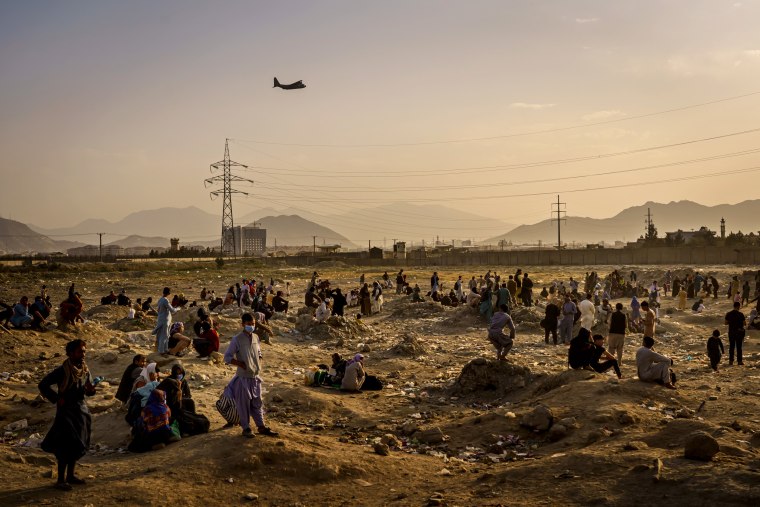The National Security Council released an assessment of the U.S. withdrawal from Afghanistan on Thursday that attempted to explain why the withdrawal unfolded so chaotically. The report mainly places the responsibility on former President Donald Trump. Some of its gripes are justified. Yet overall the document deflects blame from President Joe Biden and obscures bigger, structural problems at the root of American failings. After all, the U.S. was withdrawing from a two-decade war that it had lost and an attempt at nation-building that had gone poorly — a legacy of failure that long predated Trump.
The general tone of the paper is defensive rather than evaluative.
Experts say that the NSC document reads more like a set of talking points than a sober, independent-minded assessment of what went wrong. “It isn’t an objective attempt to identify or summarize lessons learned,” tweeted Jonathan Schroden, who directs the Countering Threats and Challenges Program at the Center for Naval Analyses. “It is a political document designed to deflect blame in advance of a gathering storm of House GOP hearings.” Indeed, the general tone of the paper is defensive rather than evaluative — and an attempt to save face for an administration seeking re-election.
The NSC review does make some fair points about how the administration was dealt a difficult hand. Trump left Biden without adequate strategic plans on how to conduct the withdrawal — originally scheduled to take place in May 2021, a few months after Biden took office.
And the document’s complaints that the terms of Trump’s withdrawal deal with the Taliban put the Biden administration in a difficult position are also fair. As Anand Gopal, the author of “No Good Men Among the Living: America, the Taliban, and the War Through Afghan Eyes,” told me in 2021, the fact that the U.S. struck a deal directly with the Taliban and left the fragile Afghan government to sort out a peace process with the Taliban on its own was disastrous. “What the U.S. did is kind of buy into its own fiction that the Afghan government was somehow a sovereign actor,” Gopal said at the time. In reality, the Afghan government was propped up financially, logistically, militarily and reputationally by outside forces — and was primed to be overrun by the Taliban. Moreover, in his zeal to get a deal done quickly, Trump made concessions — like the freeing of thousands of Taliban prisoners — that might’ve been avoidable.
But analysts of the war caution that it’s unclear whether the U.S. would’ve been able to secure a better agreement with the Taliban or forced the Taliban to come to a meaningful, even if short-lived, peace agreement with the Western-backed Afghan government. The U.S. had lost the war and was withdrawing, leaving the Taliban with no incentive to make major concessions.
“I think there are certain things that the Trump administration could’ve done that might have made a marginal difference, but at the end of the day we’d probably be in the same position because the Taliban had the upper hand,” Adam Weinstein, a research fellow at the Quincy Institute who focuses on security, trade and rule of law in Afghanistan and Pakistan, told me.
The Taliban “had a cohesive fighting force with strong esprit de corps, willingness to fight, and commanders dedicated to the cause of winning above their personal enrichment,” Weinstein said. By contrast, the Afghan security forces lacked the will to fight and were demoralized by a corrupt and disorganized government and officer corps. When the Taliban began to sweep the country ahead of the U.S. withdrawal, many Afghans surrendered en masse.
The Afghan government and security forces’ fragility was not just a product of Trump, but of a failed bipartisan effort over the course of decades to build durable state infrastructure and military power in Afghanistan. That project replicated a classic rentier state problem, where money from outside countries flowed to corrupt local elites, instead of toward trusted institutions with mass buy-in from the native population. The entire enterprise of remaking Afghanistan was a failure, and that was a product of the entire U.S. foreign policy apparatus’ ideological and strategic errors.
There’s no pretty way to end something as ugly as war — particularly if you’ve lost.
The Biden administration also deserves blame for trying to maintain the illusion that this project was working. The NSC review argues that the administration failed to make evacuations of vulnerable Afghan partners — such as interpreters — more of an urgent priority only because it wanted to “avoid signaling a lack of confidence in the ANDSF [Afghan security forces] or the Afghan government’s position.” But the game of trying to maintain the appearance of the government’s legitimacy ultimately led to many Afghan translators being left behind — an unconscionable outcome.
There were of course high-profile tragedies in the final days of the withdrawal — the Islamic State suicide bombing that killed scores of Afghan civilians and 13 U.S. service members, as well as a retaliatory drone strike that accidentally targeted civilians. But in the scheme of a war that killed thousands upon thousands of Afghan civilians, it’s hard to look at those horrible events as a problem of withdrawal. Had the U.S. stayed longer, many more innocent people would’ve died for a pointless war. There’s no pretty way to end something as ugly as war — particularly if you’ve lost.

